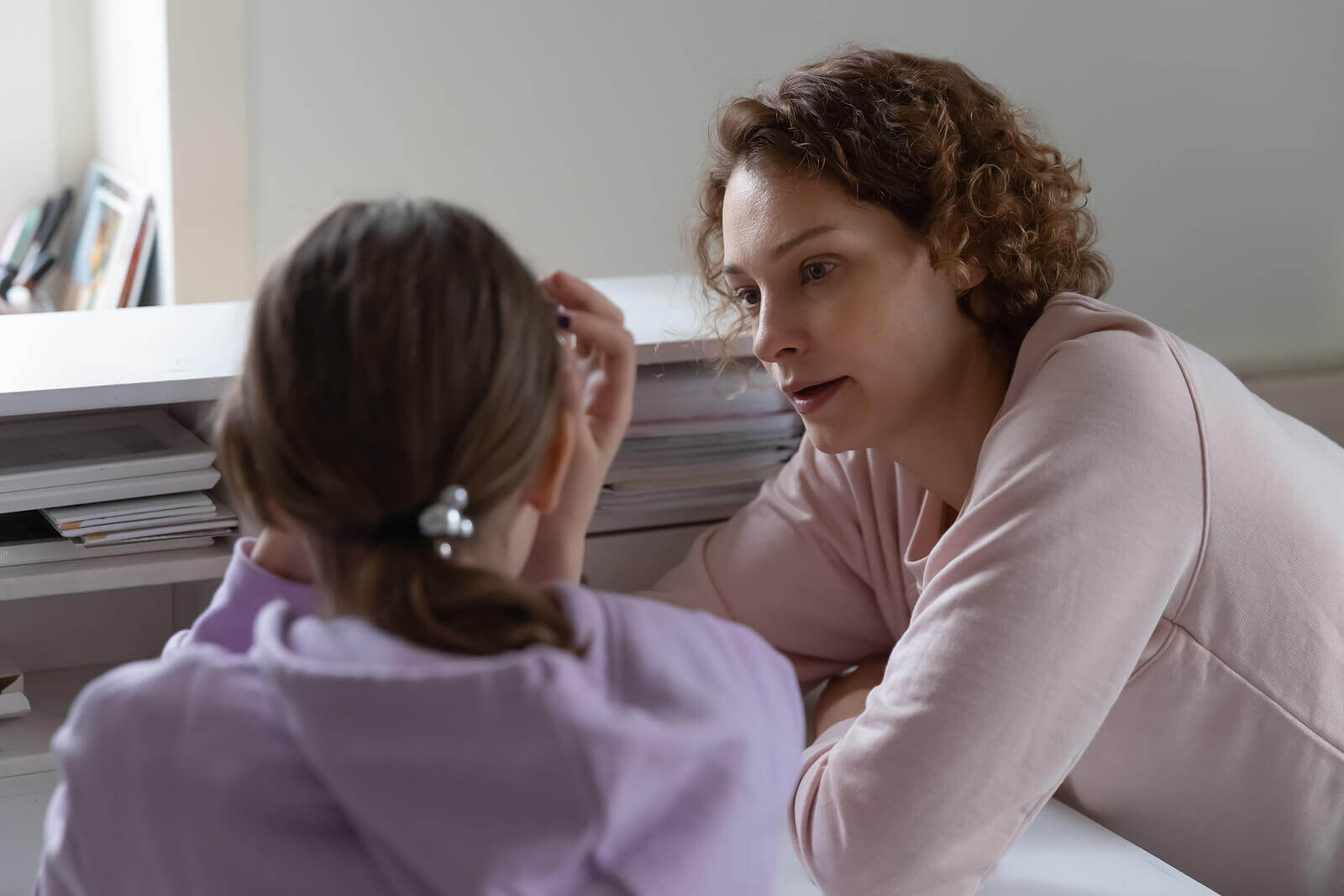Does Your Teenager Have Social Anxiety?

Does your teenager have social anxiety? And if so, how can you can tell? Although social anxiety disorders affect one in eight children, they’re often not recognized as mental health problems in teenagers. This disorder can take many forms and look different from person to person, making it difficult to identify.
Most parents and adults dismiss anxiety symptoms as shyness or teenage stress that their children will eventually overcome. However, social anxiety is a disorder that can become worse and debilitating over time if left untreated.
Indicators of social anxiety
Poor academic performance, missed opportunities for meaningful social experiences and substance abuse can all be indicators of social anxiety. Recognizing social phobia in teens is crucial to easing their transition to adulthood. Parents and other caregivers have a responsibility to make sure they get help.
Next, we’re going to tell you about the indicators of social anxiety in adolescents so that you can recognize it as soon as possible and seek help, if necessary. Also, it’s important to pay attention to your teen’s attitude and behavior.

Extreme shyness
Social anxiety can show up as extreme shyness or discomfort in your teenager when they become the center of attention. Performers generally experience stage fright, but you need to address extreme discomfort, passivity or inactivity in the limelight.
While most people feel that this is due to teens’ fear of embarrassing themselves in front of their peers, this isn’t always the case. Take the time to talk to your child about why they couldn’t do things in front of others. In addition, avoid using an accusatory tone to avoid making your child get defensive.
Social anxiety: lower academic performance
It’s important that you pay attention to your child’s academic performance. When grades start to drop, it’s normal for you to worry. Unfortunately, social anxiety isn’t as evident as the drop in grades.
Social anxiety provides little clues, like hesitancy to speak in front of the class, fear of being asked to speak in front of the class, or even outright refusal to be part of class activities.
If possible, talk to your child’s teacher about your concerns and ask to be informed immediately if your child engages in suspicious behavior that may lead to social anxiety. In this case, they may need professional help to overcome it.
Consider if your child has friends (or not)
Take into account whether your child has friends or not. It’s common for teens to spend hours texting, going to parties and events, or hanging out with friends after school.
Many teens will be part of a large group or at least have a couple of friends. However, teens with social anxiety often withdraw from other people or minimize contact. They would rather attend class without doing their homework than ask a classmate about something they didn’t understand.
Also, they might have trouble making eye contact, initiating or joining conversations, and being part of school organizations. They go to class because they have to, but they’d rather stay home alone.

What’s your child’s confidence level?
Observe the level of confidence your child has. Most teens with social anxiety doubt whether they’re good enough for other people or worry excessively about how others see them. Their fear of being ridiculed or rejected solidifies in their minds. Often, they look for signs that people don’t like them.
This negative attitude towards meeting other people is so pervasive that it can lead to low self-esteem and a very profound inferiority complex. It’s very important that they learn how to accept themselves as they are and to love themselves. Working on their self-esteem is essential.
How your teenager reacts in social situations
People with social anxiety also have physical symptoms, especially if they’re in social situations, like family gatherings or school events. Signs to look for include diarrhea, nausea, excessive sweating, heart palpitations and shortness of breath.
Conclusion on social anxiety
If your teenager experiences any of these symptoms before or during a social event, they might be experiencing social anxiety. If your child has any symptoms of anxiety, take them to a psychologist for a consultation and a thorough examination.
Chances are high that your child knows that their reactions to social situations are irrational, but doesn’t know where or how to ask for help. Give them the support they need.
Does your teenager have social anxiety? And if so, how can you can tell? Although social anxiety disorders affect one in eight children, they’re often not recognized as mental health problems in teenagers. This disorder can take many forms and look different from person to person, making it difficult to identify.
Most parents and adults dismiss anxiety symptoms as shyness or teenage stress that their children will eventually overcome. However, social anxiety is a disorder that can become worse and debilitating over time if left untreated.
Indicators of social anxiety
Poor academic performance, missed opportunities for meaningful social experiences and substance abuse can all be indicators of social anxiety. Recognizing social phobia in teens is crucial to easing their transition to adulthood. Parents and other caregivers have a responsibility to make sure they get help.
Next, we’re going to tell you about the indicators of social anxiety in adolescents so that you can recognize it as soon as possible and seek help, if necessary. Also, it’s important to pay attention to your teen’s attitude and behavior.

Extreme shyness
Social anxiety can show up as extreme shyness or discomfort in your teenager when they become the center of attention. Performers generally experience stage fright, but you need to address extreme discomfort, passivity or inactivity in the limelight.
While most people feel that this is due to teens’ fear of embarrassing themselves in front of their peers, this isn’t always the case. Take the time to talk to your child about why they couldn’t do things in front of others. In addition, avoid using an accusatory tone to avoid making your child get defensive.
Social anxiety: lower academic performance
It’s important that you pay attention to your child’s academic performance. When grades start to drop, it’s normal for you to worry. Unfortunately, social anxiety isn’t as evident as the drop in grades.
Social anxiety provides little clues, like hesitancy to speak in front of the class, fear of being asked to speak in front of the class, or even outright refusal to be part of class activities.
If possible, talk to your child’s teacher about your concerns and ask to be informed immediately if your child engages in suspicious behavior that may lead to social anxiety. In this case, they may need professional help to overcome it.
Consider if your child has friends (or not)
Take into account whether your child has friends or not. It’s common for teens to spend hours texting, going to parties and events, or hanging out with friends after school.
Many teens will be part of a large group or at least have a couple of friends. However, teens with social anxiety often withdraw from other people or minimize contact. They would rather attend class without doing their homework than ask a classmate about something they didn’t understand.
Also, they might have trouble making eye contact, initiating or joining conversations, and being part of school organizations. They go to class because they have to, but they’d rather stay home alone.

What’s your child’s confidence level?
Observe the level of confidence your child has. Most teens with social anxiety doubt whether they’re good enough for other people or worry excessively about how others see them. Their fear of being ridiculed or rejected solidifies in their minds. Often, they look for signs that people don’t like them.
This negative attitude towards meeting other people is so pervasive that it can lead to low self-esteem and a very profound inferiority complex. It’s very important that they learn how to accept themselves as they are and to love themselves. Working on their self-esteem is essential.
How your teenager reacts in social situations
People with social anxiety also have physical symptoms, especially if they’re in social situations, like family gatherings or school events. Signs to look for include diarrhea, nausea, excessive sweating, heart palpitations and shortness of breath.
Conclusion on social anxiety
If your teenager experiences any of these symptoms before or during a social event, they might be experiencing social anxiety. If your child has any symptoms of anxiety, take them to a psychologist for a consultation and a thorough examination.
Chances are high that your child knows that their reactions to social situations are irrational, but doesn’t know where or how to ask for help. Give them the support they need.
All cited sources were thoroughly reviewed by our team to ensure their quality, reliability, currency, and validity. The bibliography of this article was considered reliable and of academic or scientific accuracy.
- Parcet, A. Á., & Rivas, M. Á. F. (2016). El miedo en el cerebro humano. Mente y cerebro, 78, 50-51. https://www.investigacionyciencia.es/files/23528.pdf
This text is provided for informational purposes only and does not replace consultation with a professional. If in doubt, consult your specialist.








